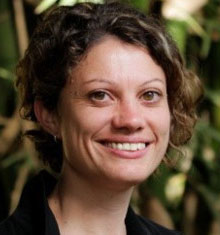
In Cameroon, migrating populations from the Central Africa Republic have no choice but to move away from conflict or resource-depleted landscapes for survival. Refugees in these situations have limited livelihood options, and for daily cooking and heating needs, firewood is often the most available source of energy, while collecting and selling firewood also provide cash income.
But the impacts of mass migration on the wider environment can be devastating. Because refugees do not own the land they depend on for a living, disputes may result over use of limited natural resource use. Woodfuel collection also leads to other impacts, such as soil erosion and land degradation, affecting both local and refugee community livelihoods.
In Garoua Boulaï, a city located in the Eastern part of Cameroon and close to the border with Central Africa republic, satellite images taken before the arrival of refugees in 2015 and 2019 show massive depletion from 83% to 35% of mature secondary forests within a 10 kilometre radius of the city, replaced by grassy savanna. As of May 2021, the municipality hosted 60,277 refugees.
“When you have massive movements of people – for example, 300,000 people or more – they need a place to live, grow food, raise animals, and find pasture for them. This can have a greater than expected impact on natural resources,” explains Leo Kortekaas, a senior development officer with the United Nations High Commissioner for Refugees (UNHCR).
Joining forces for people and planet
A new brief outlines an approach undertaken by the EU-funded Governing Multifunctional Landscapes Sustainable Woodfuel project to address the social, environmental and economic challenges resulting from mass migration. A team of researchers from the Center for International Forestry Research and World Agroforestry (CIFOR-ICRAF) provided technical support and co-designed, outlined and implemented a management strategy in partnership with a local non-governmental organization in Cameroon called Action pour la Promotion et la CREation (APCRE), which has experience in developing nurseries to promote land restoration as well as in raising awareness to protect the environment and building links between local and refugee communities.
As part of an integrated approach, other partners in the project included international, national, regional and local organizations such as the UNHCR, European Union, Lutheran World Federation, and Deutsche Gesellschaft für Internationale Zusammenarbeit (GIZ) GmbH; and local and national government agencies, as well as chiefs and refugee communities.
To manage reforestation efforts, more than 90,000 seedlings were planted in local nurseries by APCRE and communities between 2020 and 2021. Trees planted were a mix of nitrogen-rich and soil fertilizing woodfuel species such as Acacia mangium and fruit trees (avocado, citrus and nuts). Including fruit trees contributes to food and income security, as well as creating an incentive for producers to care for the trees planted in their fields.
Public agencies such as primary schools also received seedlings to raise awareness among children about the importance of trees and the need to preserve forests. Both host communities and refugees received training on tree planting, involving both men and women volunteers at each step.
Local ownership and clear responsibilities are key to reforestation success, and the project involved traditional and religious authorities to ensure follow up and protection of the tree nurseries. To prevent bush fires and grazing or trampling by stray livestock, the project recommended building enclosures, and involved communities in the monitoring of compliance through the establishment of rules such as watering young plants and protecting trees from fire or browsing animals.
Planning together early for success
“Including energy supply and livelihood options early on in a ‘unified’ conceptual framework for initial humanitarian interventions in refugee situations makes it easier to avoid damage and long-term impacts,” said Abdon Awono, a CIFOR-ICRAF scientist and co-author of the brief.
“Fruit trees take on average 5–7 years to produce fruit and need rigorous care for the first three years after planting,” he added. “So, community involvement and long-term follow-up and monitoring were essential elements of the project to ensure long-term forest management and improved cookstove adoption.” Refresher training aimed to build capacity and care for trees or increase use of the improved cookstoves.
“The options developed in this project in Garoua Boulaï aim to contribute, over the long term, to ensuring a social and ecological balance in landscapes with vulnerable forest areas, to withstand pressure on resources and contribute to sustainable woodfuel value chains,” said Awono.
There are many refugee settlements in East Cameroon, and this model could be useful for scaling out to other settlements. As it is based on an integrated landscape and value chain approach, this model involves multiple stakeholders at all stages to strengthen local governance and support awareness-raising campaigns and training.
This initiative is part of the Governing multifunctional landscapes in Sub-Saharan Africa: Managing trade-offs between social and ecological impacts (GML) project, which is financed by the European Union.
We want you to share Forests News content, which is licensed under Creative Commons Attribution-NonCommercial-ShareAlike 4.0 International (CC BY-NC-SA 4.0). This means you are free to redistribute our material for non-commercial purposes. All we ask is that you give Forests News appropriate credit and link to the original Forests News content, indicate if changes were made, and distribute your contributions under the same Creative Commons license. You must notify Forests News if you repost, reprint or reuse our materials by contacting forestsnews@cifor-icraf.org.












